
The politics of Zimbabwe occurs in a society deeply divided along lines of race, ethnicity, gender and geography. The ZANU–PF party has historically been dominant in Zimbabwe politics. The party, which was led by Robert Mugabe from 1980 to 2017, has used the powers of the state to intimidate, imprison and otherwise hobble political opposition in Zimbabwe, as well as use state funds and state media to advance the interests of the party.
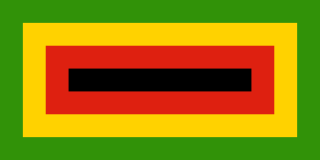
The Zimbabwe African National Union – Patriotic Front (ZANU–PF) is a political organisation which has been the ruling party of Zimbabwe since independence in 1980. The party was led for many years by Robert Mugabe, first as prime minister with the Zimbabwe African National Union (ZANU) and then as president from 1987 after the merger with the Zimbabwe African People's Union (ZAPU) and retaining the name ZANU–PF, until 2017, when he was removed as leader.
Welshman Ncube is a Zimbabwean lawyer, businessman and politician. He is the founding MDC leader and former President of Zimbabwean political party Movement for Democratic Change – Ncube. He currently serves within the Citizen Coalition for Change (CCC). He is a practicing lawyer in the firm Mathonsi Ncube Law Chambers, where he is the senior partner at their Bulawayo offices. He also runs a number of business ventures, including a farm in the Midlands Province.
Disabled Peoples' International (DPI) is a cross disability, consumer controlled international non-governmental organization (INGO) headquartered in Ottawa, Ontario, Canada, and with regional offices in Asia-Pacific, the Middle East, Europe, Africa, Latin America, and North America and the Caribbean. DPI is a network of national organizations or assemblies of disabled people, established in 1980–81 to promote the human rights of disabled people through full participation, equalization of opportunity and development. DPI assists organisations in over 152 nations with the day to day issues of helping disabled people. They also host assemblies and symposiums across the world with their different national branches.

Constitution of Nepal 2015 is the present governing Constitution of Nepal. Nepal is governed according to the Constitution which came into effect on 20 September 2015, replacing the Interim Constitution of 2007. The constitution of Nepal is divided into 35 parts, 308 Articles and 9 Schedules.
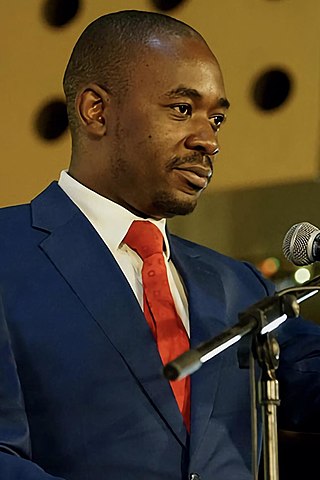
Nelson Chamisa is a Zimbabwean politician and the former President of the Citizens Coalition For Change. He served as Member of the House of Assembly of Zimbabwe for Kuwadzana East, Harare. Chamisa was the MDC Alliance's candidate for president in the 2018 general election, having previously been the leader of the party's youth assembly. He was the Presidential candidate for the Citizens Coalition for Change in the 2023 Zimbabwean Presidential election. He has served as the former chairperson of national youth for the same party as well as the Secretary for Information and Publicity for the opposition party Movement for Democratic Change (MDC). In 2003, at the age of 25, Chamisa became the youngest Member of Parliament. Chamisa was also the youngest cabinet minister in Government of National Unity of Zimbabwe in 2009.
Daniel Fortune Molokele is a Zimbabwean pro-democracy human rights lawyer well known for his fight for democracy. He currently resides in Hwange, Zimbabwe
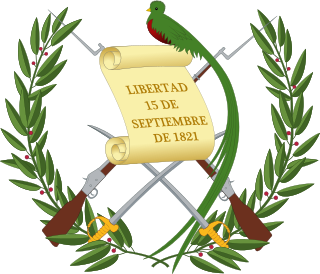
The Constitution of Guatemala is the supreme law of the Republic of Guatemala. It sets the bases for the organization of Guatemalan government and it outlines the three main branches of Guatemalan government: executive branch, legislative branch, and judicial branch.

The Movement for Democratic Change (MDC) was a Zimbabwean political party organised under the leadership of Morgan Tsvangirai. The MDC was formed in 1999 as an opposition party to President Robert Mugabe's Zimbabwe African National Union – Patriotic Front (Zanu-PF). The MDC was made up of many civic groups who campaigned for the "No" vote in the 2000 constitutional referendum, which would limit a president's service to two terms, before the introduction of a prime minister, as well as giving legal immunities to the state.
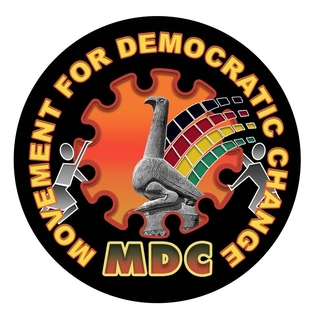
The Movement for Democratic Change – Tsvangirai (MDC–T) is a centre-left political party and was the main opposition party in the House of Assembly of Zimbabwe ahead of the 2018 elections. After the split of the original Movement for Democratic Change in 2005, the MDC–T remained the major opposition faction, while a smaller faction, the Movement for Democratic Change – Ncube, or MDC–N, was led by Welshman Ncube.
The Zimbabwe African People's Union – Federal Party is a minor Zimbabwean political party, based in Matabeleland. ZAPU-FP split from Agrippa Madlela's ZAPU party, purportedly a revival of those members of ZAPU who had rejected the 1987 merger with ZANU-PF in January 2002, following attempts by a faction of ZAPU led by Agrippa Madlela not to contest the Zimbabwean presidential election, 2002 a ZAPU founder Paul Siwela, was seconded to run as ZAPU's presidential candidate but was blocked by Aggripa Madlela's faction which itself was accused of accepting payments from the MDC which feared that ZAPU's participation in the election would split the anti-Mugabe vote in Matabeleland.

The Movement for Democratic Change – Ncube (MDC–N) was a Zimbabwean political party led by politician and attorney Welshman Ncube. It was founded in 2005 when the Movement for Democratic Change split apart and in the 2008 general election, it was known as the Movement for Democratic Change – Mutambara (MDC–M) in contrast to the larger Movement for Democratic Change – Tsvangirai (MDC–T). The MDC–N and the MDC–T operated as separate opposition parties until their re-unification in 2018. The re-united party now operates under the original name, the MDC.

Morgan Richard Tsvangirai was a Zimbabwean politician who was Prime Minister of Zimbabwe from 2009 to 2013. He was president of the Movement for Democratic Change, and later the Movement for Democratic Change – Tsvangirai (MDC–T), and a key figure in the opposition to former president Robert Mugabe.
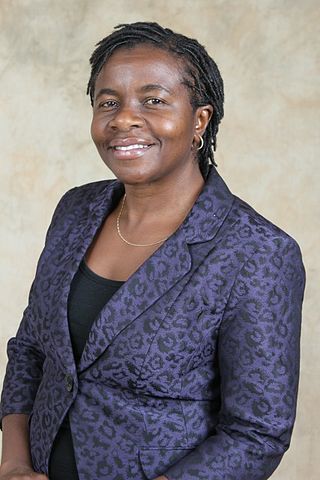
Fungayi Jessie Majome (born 20 December 1971) was a Member of the National Assembly of the Parliament of Zimbabwe for Harare West constituency on an MDC-T ticket elected 1st in 2008 and then in 2013. She was the Chairperson of Parliament of Zimbabwe's Portfolio Committee on Justice, Legal and Parliamentary Affairs. She was a member of the Parliamentary Legal Committee and the Portfolio Committee on Local Government Rural and Urban Development. During Zimbabwe's constitution making process of 2009 to 2013 she was a member of the 25 member Parliamentary Select Committee (COPAC) on the new Constitution established by the political settlement Global Political Agreement. She served as its Spokesperson and Co-Vice Chairperson.
David Anthony Chimhini was born on 10 June 1950 in Mutasa and is the MP for Mutasa North in Manicaland province, Zimbabwe. He is the father of George Chimhini, Shupikayi Chimhini. Hon. Chimhini has three wives.
Maxwell Shumba is the founding president of the Zimbabwe First Party. He is a former chemistry educator and researcher and a global regulatory chemical compliance expert. He has publications in reputable journals. Shumba taught at Nyatsime College in Mashonaland West, Zimbabwe, where he was Acting Vice Principal, Prince Edward School in Harare and Caprivi Senior Secondary School in Namibia.

The Liberal Democrats of Zimbabwe was formed in 2015 from South Africa. It is a political party registered in terms of ZEC requirements in Zimbabwe. The party did not participate in the 2018 general election. In 2016 it petitioned the Zimbabwean Embassy in Pretoria over the spending of US$800,000 on Robert Mugabe's birthday when many Zimbabweans were starving.
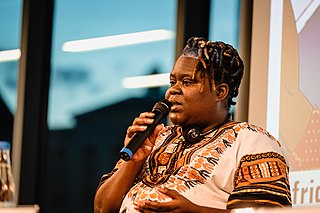
Linda Tsungirirai Masarira is a Zimbabwean politician who served as a spokesperson for one of the smaller faction of the opposition parties in Zimbabwe, MDC-T led by Thokozani Khupe.
Cecilia Chimbiri is a Zimbabwean pro-democracy activist and human rights defender. She served as Acting Youth Chairperson of the MDC Alliance. She is a member of the Citizens Coalition for Change led by Nelson Chamisa.
Yvonne Musarurwa is a Zimbabwean politician and political rights activist. She is Proportional Representative Member of Parliament and the current National Youth Chairperson of the Movement for Democratic Change Alliance. She is also the chairperson of Environment, Tourism and Climate portfolio of the parliament of Zimbabwe











